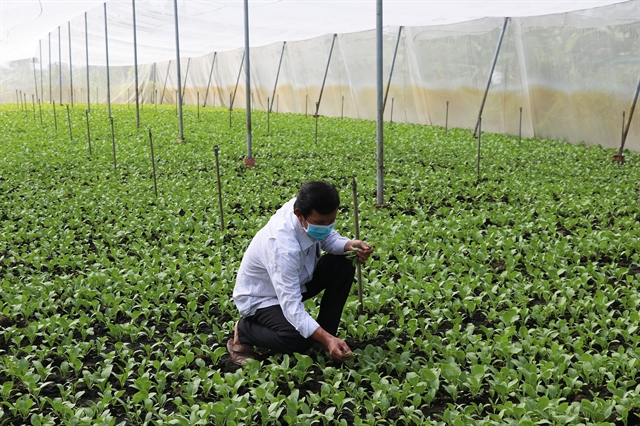 Society
Society

 |
| Vegetables are planted in a net house of the Hòa Thạnh Agriculture Co-operative in Gò Công Tây’s Bình Tân Commune. — VNA/VNS Photo Hữu Chí |
TIỀN GIANG — The Cửu Long (Mekong) Delta province of Tiền Giang has increased the application of advanced farming techniques and linkages among stakeholders in growing vegetables.
More farmers are using hydroponic farming, plastic mulch to cover soil beds to prevent the growth of grass and diseases, and polygreen and net houses to grow vegetables, according to the province’s Department of Agriculture and Rural Development.
Farmers have also increased using machines to till land and automatic irrigation facilities, it said.
The province has 100 polygreen houses each covering 300-1,000sq.m and 120 net houses for growing various types of vegetables.
It has 210ha of vegetables that meet Vietnamese good agricultural practices (VietGAP) standards.
The province has developed concentrated areas that grow high-quality vegetables which have high market demand.
The areas include pennywort growing areas covering thousands of hectares in Châu Thành District, sawtooth coriander growing areas covering hundreds of hectares in Chợ Gạo District, and watermelon growing areas in 3,000ha in Gò Công Tây, Cai Lậy and Cái Bè districts.
The watermelons are planted in rice fields which grow two rice crops and one watermelon crop a year.
Nguyễn Văn Mẫn, director of the department, said the development of vegetable cultivation has high socio-economic efficiency, and many farmers have escaped poverty and become wealthy from growing vegetables.
Farmers earn a profit of VNĐ47-290 million (US$2,000-12,300) per hectare of vegetable crop, 2.2-13 times higher than growing rice, according to the department.
The province has developed more co-operatives that specialise in growing vegetables and has secured outlet for farmers.
The co-operatives have contracts to sell vegetables to collective kitchens, supermarkets and convenience shops inside and outside the province.
They produces about 4-6 tonnes of 38-40 kinds of vegetables a day each.
The Hòa Thạnh Agriculture Co-operative in Gò Công Tây’s Bình Tân Commune, for instance, grows 15ha of clean vegetables and sells its products to supermarkets and collective kitchens in Mỹ Tho.
The co-operative’s members grow vegetables to meet safe standards.
Nguyễn Thị Cẩm, a member, has 1,000sq.m of vegetable farming area and voluntarily participated in the co-operative when it was established in 2017.
“Previously, my vegetables had unstable prices. After joining the co-operative, my vegetables have secured stable prices and profits,” she said.
Nguyễn Thanh Quang, director of the co-operative, said the co-operative will expand areas to grow clean vegetables, seek more outlets and attract more members.
It will focus on improving vegetable quality and its brand name, he said.
The number of the co-operative’s members has increased from nine when it was established to 54 now.
In the ongoing winter-spring crop, farmers in the province have planted 18,000ha of vegetables.
They have harvested more than 13,000ha of the crop with a total output of 274,000 tonnes as of early this month.
Châu Thành and Chợ Gạo districts and Mỹ Tho City are the province’s major vegetable growing localities that account for 50 per cent of the province’s total vegetable output. VNS




